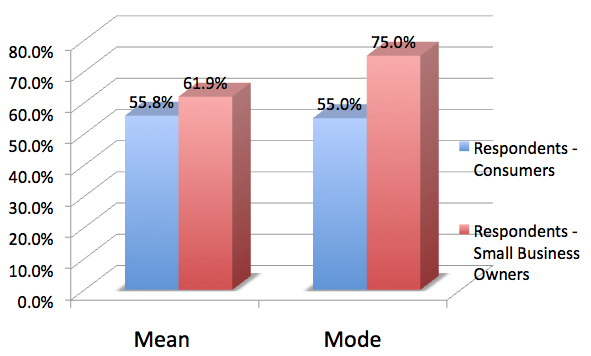In June, Mike Blumenthal takes a deep look at customer complaints with a series of articles. View all of the posts covering strategy, ideas, customer insight, survey data and more to improve how your business handles customer complaints.
We all think we are doing a great job running our businesses. But are we doing as well as we think we are? I know personally that I almost always have the confidence that I am doing an excellent job at what I set out to do. But I also know that confidence persists even when concrete evidence seems to contradict it.
Does Your Business See It’s Customer Service Clearly?
Cognitive bias, the tendency for humans to see things the way that they want to and not the way that they really are, is a common idea in psychology. Having run (and shut down) several small local businesses I certainly have fallen prey to this problem more than once. And it appears to affect all of us from the scientist to the business person.
In thinking about customer complaints I was curious whether cognitive biases, like the Optimism bias or Overconfidence effect, influenced a small business’s view point and whether that might impact their ability or willingness to hear complaints and understand their benefit. Anecdotally I know that it affected me but I wanted to see if I could measure the effect more broadly.
What Small Business Owners Think vs. What Consumers Think
To answer a part of that question I performed a small experiment. Google Surveys gave me access to two distinct audiences; US adult Internet users (consumers) and a second, more specific group, small business owners and managers. I hypothesized that they would respond to some questions differently and that difference might reflect their specific bias.
I asked these two groups this same question:
What percentage of local merchants provide excellent service?
The consumers answered in a way that positioned their sentiment very close to the middle. On average (the mean), consumers estimated that ~56% of local businesses provided excellent service and that middle range (55%) was also their most common answer (the mode).
Small business owners and managers however shifted out of that mid range in their answers. For them, ~62% on average (the mean) of local merchants provided excellent service. However, more telling, their most frequent answer (the mode) was that 75% of local businesses provided excellent service.
Clearly this group of small business people felt that their peers, local merchants, offered excellence in service more often than their consumer counterparts.
The Danger Of Bias In Customer Service
Do small business owners (I include myself in that group) suffer from the bias of overestimation? Do small businesses owners think that they typically provide excellent service more often than consumers think they do? It would appear so. While not conclusive my data certainly shows that business owners and consumers have a difference of opinion about local merchants in this regard.
Yet in that overestimation lies a danger when we hear a complaint. If we think we are excellent even when we may have failed, we are likely to be less receptive to legitimate criticisms and complaints. And less able to fix them without doing more harm.
It is safe to assume that we do in fact have these well documented biases and my contention is that we have to be aware of them particularly when dealing with complaints. We have to entertain as a real possibility, that we erred.
It will allow us to achieve better outcomes. In the case of business this means more profitability. And while it may occasionally mean “firing” a customer it usually means making things right when they go wrong.
But if we suffer from these subconscious biases how can we avoid their pitfalls so that when we get a valid customer complaint we can handle it properly?
Remain Open To Your Customers Point Of View
The solution? This article from the Harvard Business Review sums it up: because most of us tend to be highly overconfident in our estimates, it’s important to “nudge” ourselves to allow for risk and uncertainty.. They suggest the following steps:
- Think Twice
- Look at past failures (Premortem)
- Take an Outside View
- Think about objectives
These are much the same as the steps to resolving a complaint successfully. And if you can keep them in mind and entertain the idea that the customer may have a point, you and your business will be the better for it.




Comments are closed.